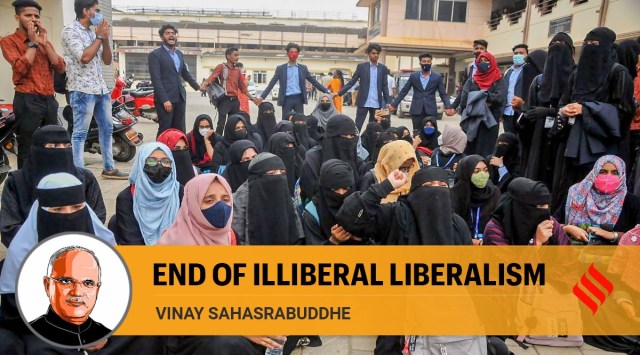
It might be a mere coincidence that three important developments took place within the span of a fortnight: The hijab verdict of the Karnataka High Court, India’s articulately-stated position at the UN on the subject of observing the International Day to Combat Islamophobia and, finally, the release and huge box-office success of the movie, The Kashmir Files. These were three different events, but the message from them is one: Pampering any community and accepting its unreasonable demands actually harms the cause of that community, instead of helping it. The message emanating from the three developments is about “anti-pamperism”.
Treated as a mere vote-bank for several decades by previous regimes in India, the entire approach of the establishment to the subject of Muslims in India — their social and economic empowerment as well as their emotional integration —has been that of handling a hot potato. Instead of dealing with the entire gamut of issues with the courage of conviction, many have been skirted, pushed under the carpet and their dispassionate analysis has been avoided. Meekly surrendering to unreasonable demands had become the usual way, right from the pre-Independence era. The entire so-called progressive establishment stands guilty of treating issues concerning Muslims either emotionally or politically, instead of intellectually and on the grounds of reason and logic. The consequences have been disastrous. But apparently, the so-called progressive establishment does not seem ready to learn and mend its ways.
Let’s start with the hijab. The Karnataka High Court judgment makes only a limited point. It says that it is too far-fetched to argue that the school dress code militates against fundamental rights. The court then states that “the prescription of dress code for the students, that too within the four walls of the classroom, as distinguished from the rest of the school premises, does not offend constitutionally-protected category of rights, when they are ‘religion-neutral’ and ‘universally applicable’ to all the students”. One cannot miss the point that those who advocate that the hijab be allowed in the classroom, thankfully, couldn’t argue that the hijab is a symbol of gender equality or liberalism. Any argument in favour of the hijab is, in fact, tantamount to the advocacy of male chauvinism and suppression of women. Favouring the hijab in the name of liberalism is taking the liberty to impose illiberal ideas.
All over the world, opinion-makers have dithered in calling a spade a spade and tried to camouflage their cold feet as liberalism. This was starkly evident in the UN’s recent resolution on the institution of the International Day to Combat Islamophobia. India courageously and logically opposed the singling out of Islamophobia, leaving aside the phobias against other belief systems. A global body like the UN did not cover itself in any glory by succumbing to the pressures of one very powerful religio-political lobby while being unconcerned about other belief systems. The Indian position shines as an example of a genuinely secular approach described as “sarva patha sam bhaav”, and for the first time in many years, India has not been shy about taking a clear position on similar issues. There was absolutely no logic in not accepting India’s suggestion that instead of instituting the International Day to Combat Islamophobia, let there be an Anti-Religiophobia Day. It is distressing, to say the least, that countries that have greatly suffered from terrorism, inadvertently promoted by their special treatment of the supporters of the supremacy of one belief system, also preferred to remain silent and support the irrationally conceived UN move.
Seen against this backdrop, one can guess why The Kashmir Files touched a chord in hearts across India. Remember, it doesn’t evoke any hatred towards any particular belief system. It is to the credit of the makers that when the movie ends, people feel sad about themselves, the echo chamber that they have inadvertently allowed to thrive and the establishment that served us pseudo-secularism in the name of true secularism simply for their political ends. Like in the hijab case and the International Day to Combat Islamophobia, here too popular feelings are evidently against giving special treatment to adherents of any particular belief system. People are against the disregarding of all human rights and the insensitivity towards the cruelty and injustice faced by the Kashmiri Pandits for no fault of theirs. Movie viewers don’t miss the point that the establishment — including the media — sheepishly acceded to the terrorists’ demand that they be referred to as “militants”. This realisation makes people restless and orients their anger more towards the same so-called progressive establishment, than towards the Muslims as a community. It is a fact that these so-called progressives, who have pampered the fanaticism of some, have harmed the social and economic development of the whole community.
Muslims in India and their so-called protectors would do well to realise that most Indians endorse the Karnataka High Court verdict, support the government’s position of instituting Anti-Religiophobia Day instead of the International Day to Combat Islamophobia and also feel that The Kashmir Files gives a voice to the voiceless victims of the mindless terrorism of the past several decades in Jammu and Kashmir. This is so because they are avowedly against any emotional or cultural secessionism or spreading a sense of separateness for the sake of being politically correct.
After all, it is a mockery of integration if one tries to accommodate secessionism simply to get the tag of “progressive”. Similarly, liberalism cannot just be about tolerating the illiberal.
This column first appeared in the print edition on April 1, 2022 under the title ‘End of illiberal liberalism’. The writer is MP, Rajya Sabha and former national vice-president of the BJP